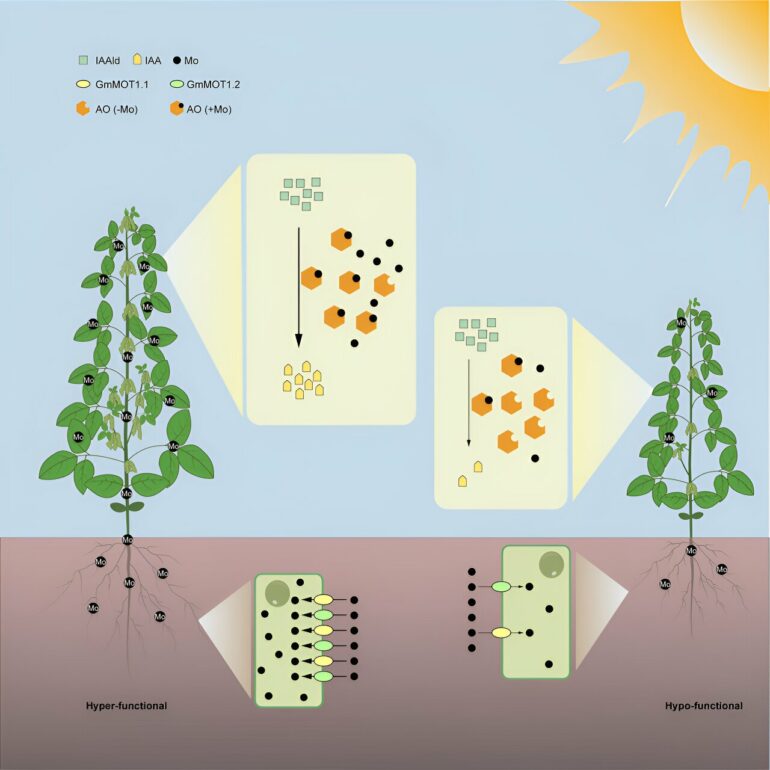In a study published in Current Biology, researchers have reported the identification of key genes controlling shoot molybdenum concentrations in soybeans and have unlocked the mystery of how molybdenum fertilizer boosts soybean yield.
Molybdenum is a trace element indispensable to plant growth. For leguminous plants, especially soybeans, molybdenum fertilizer is particularly important. The high demand for molybdenum in leguminous plants is often assumed to be associated with the significant amount of molybdenum required for symbiotic nitrogen fixation. However, this hypothesis seems to contradict the practical application of foliar molybdenum fertilizer because nodule nitrogen fixation occurs at the root.
Soy is the most important plant-derived source of dietary protein and oil, making soybeans crucial for global food security and human health. Despite the importance of soybeans, though, scientists previously weren’t clear whether different soybean varieties showed a natural variation in molybdenum utilization and, if they did, how such a potential variation might affect soybean production and how such differences could be leveraged.
The current research—involving Chao Daiyin’s group at the Center for Excellence in Molecular Plant Science of the Chinese Academy of Sciences (CAS) and Tian Zhixi’s group at the Institute of Genetics and Developmental Biology of CAS—helps answer these questions.
Using a genome-wide association study and ionomics, the researchers identified two genes, GmMOT1.1 and GmMOT1.2, that control natural variation in molybdate uptake and transport in soybeans.
Through further analysis, they revealed five major haplotypes of GmMOT1.1 and GmMOT1.2 in soybean varieties, with haplotype 5 exhibiting the highest expression and molybdenum transport capacity, while haplotype 4 showed the lowest expression and transport capacity. A series of genetic and molecular experiments subsequently indicated that GmMOT1.1 and GmMOT1.2 are involved in molybdate uptake in the roots and root-to-shoot transport of molybdate.
The researchers also observed that when the function of GmMOT1.1 and GmMOT1.2 was impaired, both the molybdenum content and yield of soybeans were significantly decreased. In contrast, enhancing their function substantially improved molybdenum utilization and soybean yield.
Interestingly, the researchers found that GmMOT1.1 and GmMOT1.2 do not affect the nitrogen-fixing ability of root nodules or other nitrogen assimilation processes in soybeans. They discovered a molybdenum-binding aldehyde oxidase in soybean leaves that catalyzes auxin synthesis, and its catalytic activity depends on molybdenum content.
When the function of GmMOT1.1 and GmMOT1.2 is enhanced, leaf molybdenum concentration increases, promoting auxin synthesis and leaf growth, ultimately increasing soybean yield. This result perfectly explains why spraying molybdenum fertilizer directly on leaves can boost soybean production in agriculture.
Furthermore, the researchers found that the distribution of different haplotypes of these two genes is closely related to soil pH. Hyperfunctional haplotypes are mainly distributed in acidic, low-molybdenum soil areas, while hypofunctional haplotypes tend to be found in alkaline, high-molybdenum soil areas. This result suggests that these two genes can be used to design molecular markers for breeding customized soybean varieties adapted to different soil pH levels.
The study reveals the genetic basis underlying natural variation in molybdenum content in soybeans, uncovers the mechanism whereby foliar molybdenum fertilizer promotes soybean yield in legume crops, and identifies molecular markers for custom soybean breeding based on soil pH. All in all, it provides a strong scientific basis for further optimizing soybean cultivation and breeding strategies to cultivate nutrient-efficient soybean varieties.
More information:
Jing Zhang et al, Natural variants of molybdate transporters contribute to yield traits of soybean by affecting auxin synthesis, Current Biology (2023). DOI: 10.1016/j.cub.2023.10.072
Provided by
Chinese Academy of Sciences
Citation:
Researchers identify molybdate transporter genes for improving soybean yield (2023, November 24)



